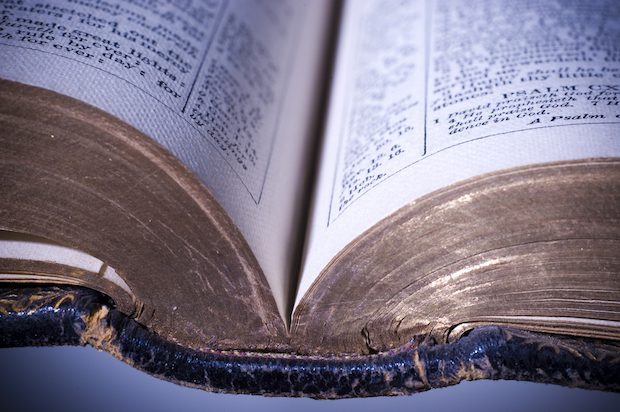Where Did All The Christians Go?

I had a great conversation this morning with a Christian woman I had just met. She was talking about her late mother, who was a grande Southern dame. The woman said that earlier in her life, she left the Methodist church in which she was raised to join a charismatic non-denominational congregation. She was really excited about it. At last, her mother said to her, “Darlin’, we all believe in Jesus, but some of us don’t have to talk about it all the time.”
We share a good laugh at that one. She went on to say that she had read something about The Benedict Option, though not the book itself, and had to agree that the world of the Christian faith is dissipating all around us. She recently attended the church of her youth for a Sunday worship service, and was shocked to see how empty it was.
I told her that this is happening all over, but it is so hard to get Christians to recognize it.
“Frog slowly boiling,” she sighed. The woman added that a friend of hers who is a pastor told her that this is a problem everybody involved in pastoral ministry knows is there, but that few can bring themselves to confront.
I thought of that conversation when I read this Matthew Hennessey column in today’s Wall Street Journal, forwarded to me by a couple of readers. He talks about going to his 89-year-old Uncle Joe’s funeral mass in Morristown, NJ. There weren’t a lot of mourners there — Uncle Joe had outlived most of the people he knew — but those Catholics who were there didn’t understand what was happening. He writes:
Only 22% of American Catholics attend weekly Mass, according to Georgetown University’s Center for Applied Research in the Apostolate. One thing that distinguishes Catholicism from other Christian denominations is the doctrine of transubstantiation. Yet in a 2010 Pew survey, 45% of Catholics said they weren’t familiar with church teaching that the consecrated bread and wine used during Communion are not mere symbols of Christ’s body and blood, but the real thing.
Catholics aren’t the only ones dealing with religious illiteracy. Pew found that 53% of American Protestants couldn’t identify Martin Luther as the man who inspired the Reformation. (Oddly, Jews, atheists, and Mormons were more familiar with Luther.) Fewer than 3 in 10 white evangelicals correctly identified Protestantism as the faith that believes in the doctrine of sola fide, or justification by faith alone.
More:
The Polish priest who said Uncle Joe’s funeral Mass seemed all too familiar with the problem of Catholics who don’t quite remember what to say or do. He politely prompted the appropriate responses from the congregation at the appropriate times.
When the moment came, he gently reminded everyone that Holy Communion in the Catholic Church is reserved for those who are “properly disposed” to receive it—that is, Catholics who are not conscious of grave sin and who have fasted for one hour.
“If you are Catholic and capable of receiving communion,” he said, “please step forward at this time.” Nearly everyone did.
Nearly everyone did because even though they have no idea what’s going on, they still consider themselves Catholics in good faith, despite being religious illiterates. Of course you don’t have to be able to teach catechism class in order to receive the sacraments, but that’s not what Hennessey is talking about here. These are people who are manifestly nominal Catholics, and nominal Christians. Only God can judge their souls, of course, but it’s not hard at all to judge the likely effect of their religious nominalism: the end of Catholicism in their place.
Yes, the Lord promised that the Church would last through the end of time. But he did not promise that the Archdiocese of Boston (or your own diocese) would last forever. The faith can disappear, indeed has disappeared, from large geographical areas—northern Africa, for instance.
Moreover, it’s both presumptuous and illogical to assume that the faith will make a comeback in another generation or two. The young adults who today don’t bother to marry in the Church are not likely to bring their children there for Baptism (if they have children). Those children, years later, aren’t likely to feel the urge to go back to their parish church (if it still stands), since they were never there in the first place. The Catholic faith is passed down from generation to generation. If parents stop teaching their children, those children have nothing to teach the grandchildren. In two generations, a thoroughly Catholic society can become mission territory. Look at Boston. Look at Quebec. Look at Ireland.
This is not just a Catholic problem. It is a problem for all Christians in the post-Christian West.
I remind you what Father Cassian of Norcia told me about the Benedict Option: Christian families who don’t do some version of it are not going to have what it takes to make it through the time of testing now upon us. I’m not asking you Christian conservatives to agree with everything I write in the book. I am asking you to open your eyes to the crisis we’re now in, and stop consoling yourself with the false idea that everything is going to be fine if we just sit still and keep doing what we’re doing. We don’t have the luxury of endless time to sort things out.
Subscribe for as little as $5/mo to start commenting on Rod’s blog.